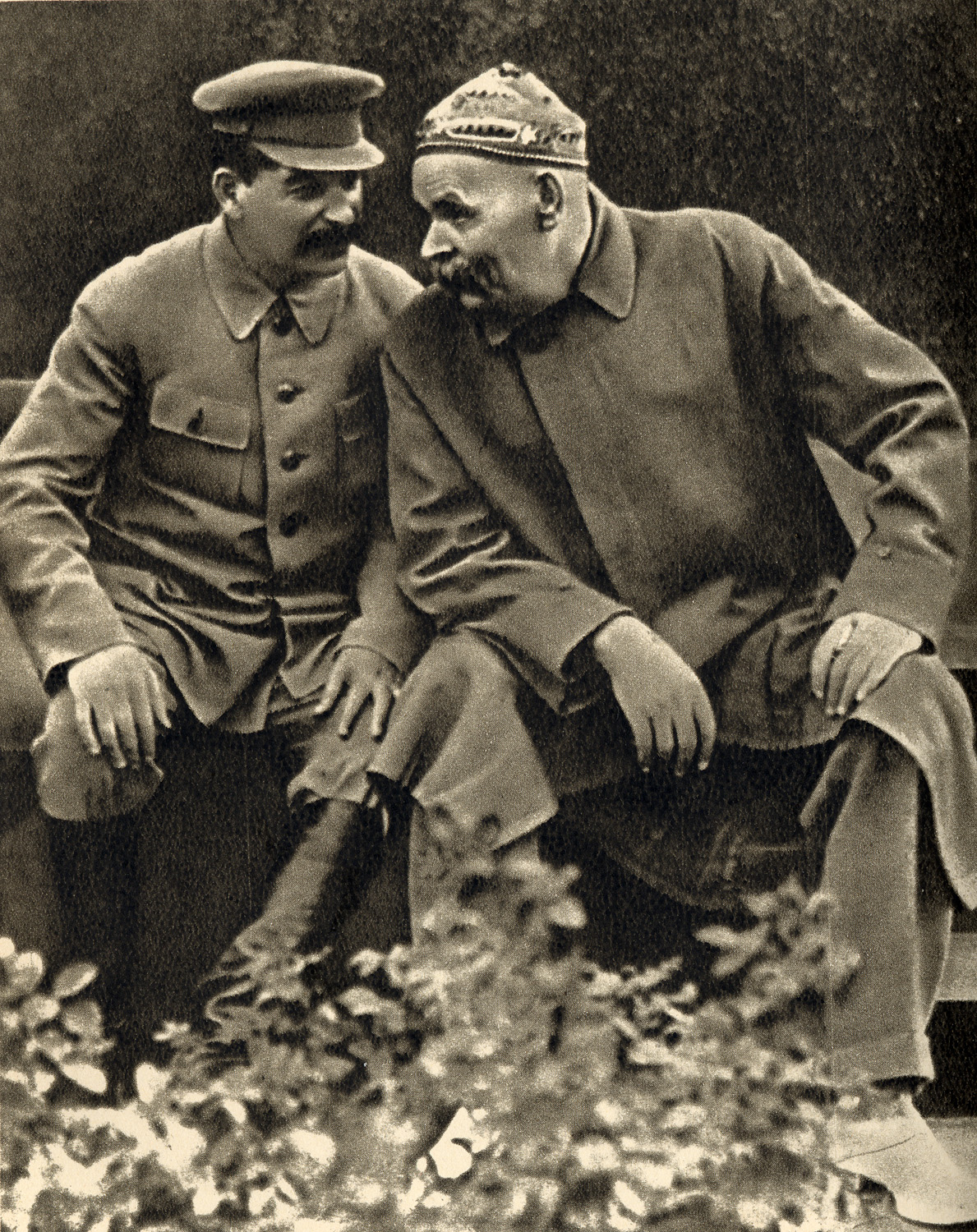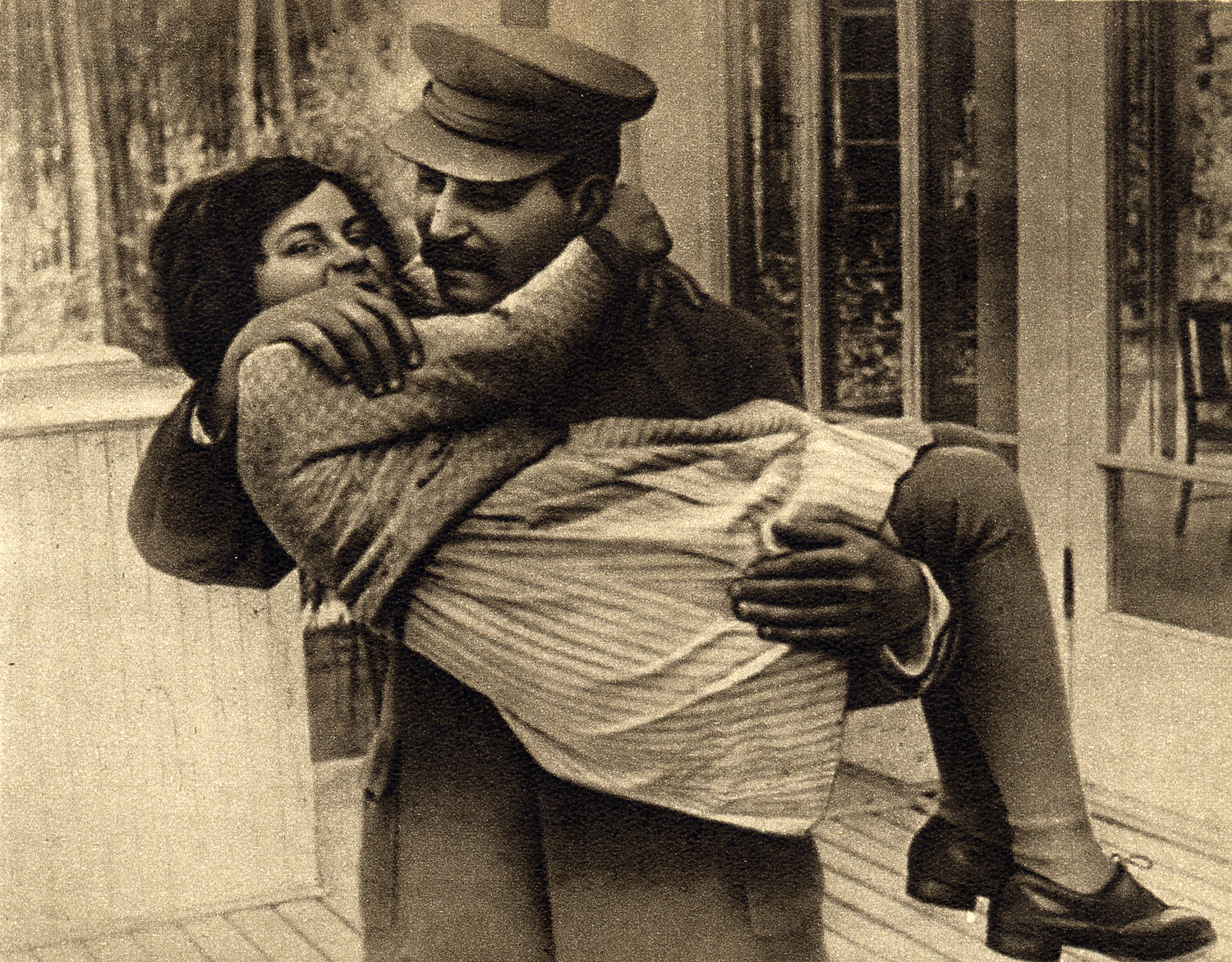.

Joseph Stalin and Maxim Gorky, 1931: photo from Pravda, 1940 (image by EugeneZelenko, 1935)
Stalin is not Russian but Georgian. His cleverness lies in patience, willpower, and good sense. He is confident and obstinate. His enemies accuse him of lacking knowledge and intelligence; they are mistaken. He is not a cultured man in the European sense of the word, not overfed with sophistry and psychological fanaticism. Stalin is a barbarian, in Lenin’s sense of the word, an enemy of Western culture, psychology and ethics. His intellect is entirely physical and instinctive, in a natural state, and without the prejudices or the moral sense of a cultured man. It has been said that men reveal their character in their bearing. I saw Stalin in May 1929 at the Pan-Russian Soviet Congress, walking up on to the stage in the Grand Theatre of Moscow. I was just below the footlights in the orchestra stalls when he appeared from behind a double row of the People’s Commissaries, the delegates from Tzic and the members of the Party’s Central Committee, lined up on the stage. He was quite simply dressed in a gray jacket of military cut and dark cloth trousers gathered into his high boots. Square-shouldered, short, thick-set, his massive head covered with black curly hair, and narrow eyes accentuated by very black eyebrows; his face was darkened by shaggy black moustaches; he walked slowly and heavily, striking the ground with his heels as he went; his head thrust forward and his arms swinging made him look like a peasant, but a peasant from the highlands—hard, patient, and obstinate. Ignoring the thunder of applause which greeted him, he walked on slowly, took his place behind Rykoff and Kalinin, raised his head, looked at the huge crowd which acclaimed him, and stood motionless and stooping slightly—his eyes fixed straight in front of him. About twenty Tartar deputies, representing the autonomous Soviet Republics of the Bakirs, the Bouriat-Mongols, Iakouts, and Daghestan alone observed a rigid silence in their stage-box. They were dressed in yellow and green silk kaftans, with silver-embroidered tartar caps on their long black shiny hair and they stared at Stalin with little narrow slit eyes: at Stalin the dictator, the iron fist of the Revolution, mortal enemy of the West and of civilized and bourgeois Europe. When the delirious shouts of the crowd began to die down, Stalin slowly turned his head toward the Tartar deputies: the Mongols’ eyes met those of the dictator. A great shout filled the theatre: it was the greeting of Proletarian Russia to Red Asia, to the people of the plains, the deserts, and the great Asiatic rivers. Again Stalin turned coolly to the crowd. He remained bent and motionless, his unseeing eyes fixed straight in front of him.

Stalin with his daughter Svetlana, 1935: photo from Pravda, 1940 (image by EugeneZelenko, 1935)
Curzio Malaparte: A Coup d'Etat that Failed: Trotsky vs. Stalin (excerpt), from La tecnica della colpo di Stato (The technique of coup d'état), 1931, translated by Sylvia Saunders, 1932
Tom,
ReplyDeletehis unseeing eyes fixed straight in front of him. . . .
3.19
light coming into cloud above blackness
of ridge, full moon light behind branch
in foreground, wave sounding in channel
ground that word let appear,
concealment of beings
that, making world material,
being person doing it
grey rain cloud against shadowed ridge,
silver of drops splashing into channel
Stalin!
ReplyDeleteTo the workers you're a darling.
The terror of the bourgeoisie
was beautiful to see
Simon,
ReplyDeleteThe terror of the bourgeoisie before the will of the Decisive Leader is always awful to behold. ("Awful" in the older sense of the term; now I believe they say "awesome").
On the day the news of Stalin's death broke, the parochial school nuns gave us an extra half hour of "recess".
Steve,
Lately it does seem that there may be, beneath us, a not very stable and not very tangible, in fact entirely tenuous and untenable
ground that word[s]let appear, to deceive --
causing
concealment of beings -- so that it then becomes possible to imagine
a whole order of substitutions and displacements, such
that, making world material,
being [the] person doing it
would become one of these substitutions -- as though there were to be
behind that silver grey rain cloud
a deeper black cloud --
cold and dark as the Kurill Islands here, very heavy rain the past twenty four hours and continuing, enormous thunderstorms in the night and a bombardment of hail such as hath ne'er been experienced. Today it still lies piled in mounds and drifts as the next wave of storms bears in. Someone says "It's global warming".
The NUNS gave you an extra half an hour? Presumably to celebrate?
ReplyDeleteExactly.
ReplyDeleteHe was regarded as a formidable agent of the devil, commander of the communist atheist regime which threatened at any moment to initiate the thermonuclear war which would extinguish life on earth.
Other than that, the nuns had nothing against him.
Tom,
ReplyDeleteThe picture of Stalin and Gorky reminds me about this Hungarian blog http://riowang.blogspot.com/ I think you would enjoy it, especially Tamás's remarkable collection of old photographs from Mallorca, Russia, eastern Europe and the Middle East.
Thanks, Artur. Yes, it was through your blog that I first found my way to Poemas del Rio Wang... a sort of mothership for this area of historical research.
ReplyDelete(In fact I found it so interesting I actually got up the courage to brave the hazards of the Blogger boiler room to put up that link.)